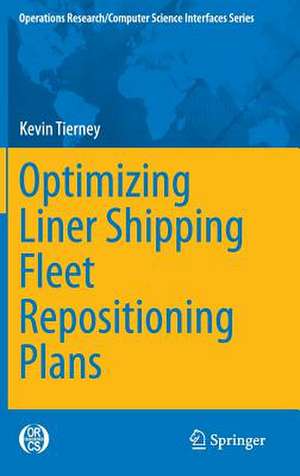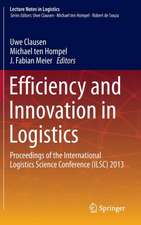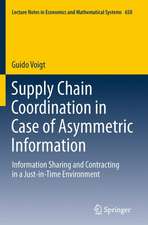Optimizing Liner Shipping Fleet Repositioning Plans: Operations Research/Computer Science Interfaces Series, cartea 57
Autor Kevin Tierneyen Limba Engleză Hardback – 25 iun 2015
| Toate formatele și edițiile | Preț | Express |
|---|---|---|
| Paperback (1) | 358.32 lei 38-44 zile | |
| Springer International Publishing – 15 oct 2016 | 358.32 lei 38-44 zile | |
| Hardback (1) | 389.49 lei 43-57 zile | |
| Springer International Publishing – 25 iun 2015 | 389.49 lei 43-57 zile |
Din seria Operations Research/Computer Science Interfaces Series
- 24%
 Preț: 921.97 lei
Preț: 921.97 lei - 18%
 Preț: 944.19 lei
Preț: 944.19 lei - 18%
 Preț: 1227.21 lei
Preț: 1227.21 lei - 18%
 Preț: 947.67 lei
Preț: 947.67 lei - 18%
 Preț: 1224.54 lei
Preț: 1224.54 lei - 20%
 Preț: 1792.96 lei
Preț: 1792.96 lei - 18%
 Preț: 944.82 lei
Preț: 944.82 lei - 20%
 Preț: 1289.93 lei
Preț: 1289.93 lei - 18%
 Preț: 961.23 lei
Preț: 961.23 lei - 18%
 Preț: 951.59 lei
Preț: 951.59 lei - 20%
 Preț: 1047.88 lei
Preț: 1047.88 lei - 20%
 Preț: 642.65 lei
Preț: 642.65 lei - 18%
 Preț: 944.82 lei
Preț: 944.82 lei - 20%
 Preț: 996.07 lei
Preț: 996.07 lei - 20%
 Preț: 989.13 lei
Preț: 989.13 lei -
 Preț: 379.09 lei
Preț: 379.09 lei - 18%
 Preț: 954.62 lei
Preț: 954.62 lei - 18%
 Preț: 945.30 lei
Preț: 945.30 lei - 24%
 Preț: 908.30 lei
Preț: 908.30 lei - 18%
 Preț: 957.32 lei
Preț: 957.32 lei - 20%
 Preț: 996.88 lei
Preț: 996.88 lei - 15%
 Preț: 646.75 lei
Preț: 646.75 lei - 20%
 Preț: 1283.49 lei
Preț: 1283.49 lei - 18%
 Preț: 949.55 lei
Preț: 949.55 lei - 15%
 Preț: 658.88 lei
Preț: 658.88 lei - 18%
 Preț: 895.58 lei
Preț: 895.58 lei
Preț: 389.49 lei
Nou
Puncte Express: 584
Preț estimativ în valută:
74.53€ • 78.02$ • 61.67£
74.53€ • 78.02$ • 61.67£
Carte tipărită la comandă
Livrare economică 07-21 aprilie
Preluare comenzi: 021 569.72.76
Specificații
ISBN-13: 9783319176642
ISBN-10: 3319176641
Pagini: 180
Ilustrații: VIII, 182 p. 49 illus., 20 illus. in color.
Dimensiuni: 155 x 235 x 15 mm
Greutate: 0.45 kg
Ediția:2015
Editura: Springer International Publishing
Colecția Springer
Seria Operations Research/Computer Science Interfaces Series
Locul publicării:Cham, Switzerland
ISBN-10: 3319176641
Pagini: 180
Ilustrații: VIII, 182 p. 49 illus., 20 illus. in color.
Dimensiuni: 155 x 235 x 15 mm
Greutate: 0.45 kg
Ediția:2015
Editura: Springer International Publishing
Colecția Springer
Seria Operations Research/Computer Science Interfaces Series
Locul publicării:Cham, Switzerland
Public țintă
ResearchCuprins
Introduction.- Containerized Shipping.- Liner Shipping Fleet Repositioning.- Methodological Background.- Liner Shipping Fleet Repositioning without Cargo.- Liner Shipping Fleet Repositioning with Cargo.- Conclusion.
Notă biografică
Kevin Tierney is currently an Assistant Professor of "Decision Support Systems and Operations Research" in the department of Business Information Systems at the University of Paderborn in Paderborn, Germany. He earned his PhD from the IT University of Copenhagen in Copenhagen, Denmark in 2013 for his work on optimizing liner shipping fleet repositioning plans as part of the ENERPLAN project. He holds a Sc.M. in Computer Science from Brown University (2010) and a B.S. in Computer Science from the Rochester Institute of Technology (2008).
Kevin Tierney researches the modeling and solution of large scale, real world optimization problems using mixed-integer linear programming, constraint programming and (meta)heuristics. He focuses in particular on problems in the maritime industry, including liner shipping networks and container terminal optimization.
Kevin Tierney researches the modeling and solution of large scale, real world optimization problems using mixed-integer linear programming, constraint programming and (meta)heuristics. He focuses in particular on problems in the maritime industry, including liner shipping networks and container terminal optimization.
Textul de pe ultima copertă
This monograph addresses several critical problems to the operations of shipping lines and ports, and provides algorithms and mathematical models for use by shipping lines and port authorities for decision support. One of these problems is the repositioning of container ships in a liner shipping network in order to adjust the network to seasonal shifts in demand or changes in the world economy. We provide the first problem description and mathematical model of repositioning and define the liner shipping fleet repositioning problem (LSFRP). The LSFRP is characterized by chains of interacting activities with a multi-commodity flow over paths defined by the activities chosen. We first model the problem without cargo flows with a variety of well-known optimization techniques, as well as using a novel method called linear temporal optimization planning that combines linear programming with partial-order planning in a branch-and-bound framework. We then model the LSFRP with cargo flows, using several different mathematical models as well as two heuristic approaches. We evaluate our techniques on a real-world dataset that includes a scenario from our industrial collaborator. We show that our approaches scale to the size of problems faced by industry, and are also able to improve the profit on the reference scenario by over US$14 million.
Caracteristici
First monograph on the increasingly important topic of Ocean Transport Logistics Provides proven optimization models for fleet repositioning Strong reference for researchers, students and practitioners












